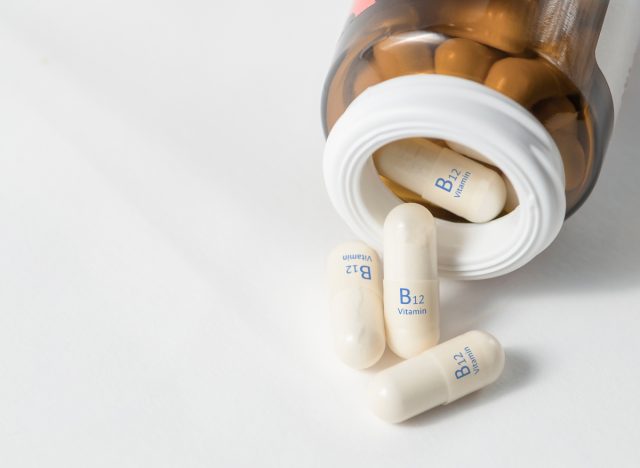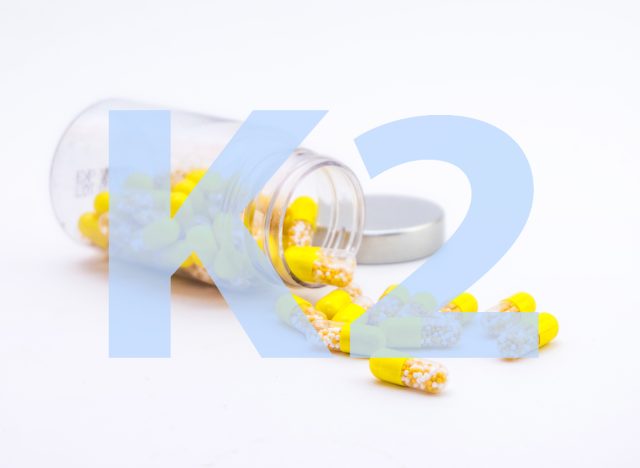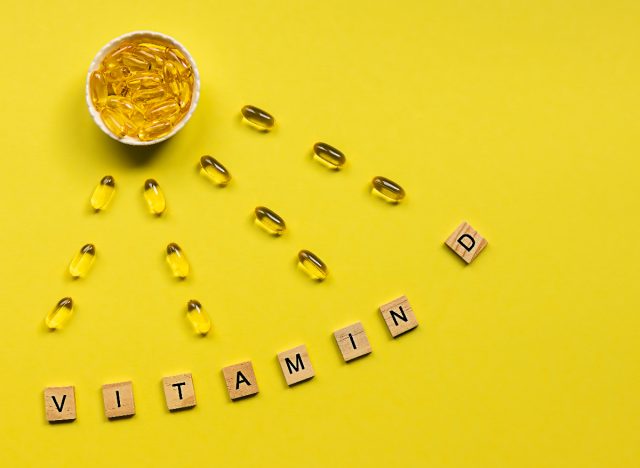4 Best Vitamins for Women To Start Taking Before Turning 40

When it comes to a morning routine that sets you up for all-day success, you likely have your habits down-pat. You may sip an herbal tea, iced matcha latte, or fresh fruit smoothie before stretching it out with yoga or meditating in a patch of sunlight. You might head out for a brisk walk or jog, or take your pup for a rejuvenating stroll around the neighborhood. Mornings may also give your health a nice little boost by taking your vitamins and supplements of choice. As a matter of fact, according to Johns Hopkins Medicine, 50% of American adults use a multivitamin or another type of vitamin on a regular basis. But which vitamins are worth your time and money, and which are not? We spoke with an expert who shares the best vitamins for women to take before 40 so you know exactly what to invest in.
According to the biostation, nutrient deficiencies are quite prominent throughout the United States. Ninety-two percent of the country's population is dealing with a minimum of one vitamin or mineral deficiency, based off of the Dietary Reference Intakes. The human body requires 13 essential vitamins in order to function to the best of its ability. These vitamins are as follows: vitamins A, C, D, E, and K, along with the B vitamins (riboflavin, thiamine, biotin, vitamin B12, vitamin B6, folate, and pantothenic acid). You can get your fill of these vitamins through foods such as veggies, fruits, lean proteins, and whole grains. Along with sticking to a well-balanced diet, you can consider taking vitamins.
To ensure you're getting the vitamins you actually need, we linked up with Lauren Manaker MS, RDN, LD, CLEC, an award-winning registered dietitian, book author, and recipe developer who sits on our Medical Expert Board. Manaker dishes out the absolute best vitamins for women to start taking before 40. Keep reading to learn more, and when you're finished, check out 10 Best Supplements You Should Be Taking After 40.
Folic Acid

"If you are turning 40 and you aren't routinely taking a folic acid supplement, you may want to reconsider, especially if you are still having menstrual cycles," Manaker tells us. "It is recommended that women of reproductive age take in 400 micrograms (mcg) of folic acid every day in case she becomes pregnant to reduce the risk of birth defects."
In addition, folic acid—also known as folate and vitamin B9—plays a key role in the formation of red blood cells, along with DNA and chromosomal repair. Folic acid works together with vitamins B12 and B6 to tame your homocysteine levels; higher levels of homocysteine are linked to cardiovascular episodes.
Vitamin B12

"The capacity to absorb vitamin B12 from food decreases as we age," explains Manaker. "Because of this, taking a vitamin B12 supplement can offer some benefits. Low levels of vitamin B12 can lead to fatigue, muscle weakness, and nausea."
The B12 vitamin is necessary for the production of red blood cells and to ensure your brain stays in good health. It's extra important for vegans to get their fill of vitamin B12, because being deficient in it could lead to nerve damage, anemia, and reasoning or memory issues.
RELATED: The #1 Best Vitamin to Take Every Day, Says Science
Vitamin K2

Next up, vitamin K2 is a nutrient many individuals don't obtain a sufficient fill of in their diets, which is certainly not a good thing. "Evidence shows that this nutrient plays an important role in our bone health," Manaker explains. "Since women become more at-risk for developing osteoporosis as they age, taking in nutrients that help keep our bones strong is an important step."
Vitamin D

Last but not least, this list of the best vitamins for women to take before 40 wraps up with vitamin D. You may be surprised to hear that a good portion of Americans are vitamin D deficient. This nutrient can have a massive impact on the health of your bones. "Again, since osteoporosis risk increases as women age, taking in nutrients that support this important aspect of our health is incredibly important when women are in their 40s," Manaker tells us.









